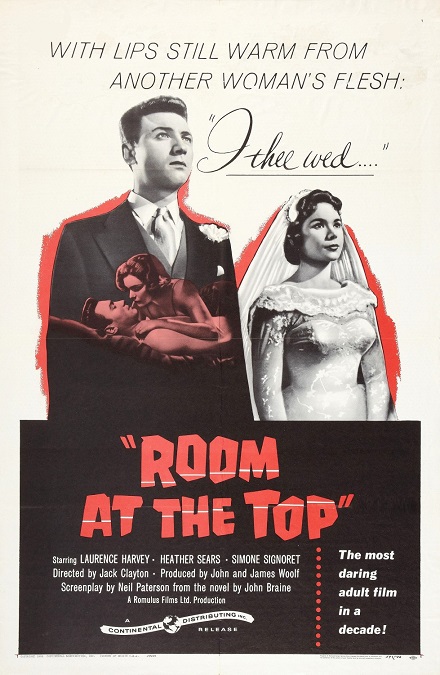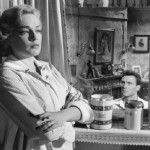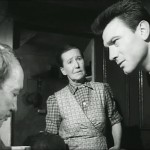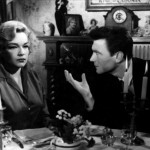
Room at the Top – 1959
This was a strange little British movie that had some good points and some bad. It wasn’t horrible, but it wasn’t great either. It was largely average, both in the plot and in the acting. It starred Lawrence Harvey, Simone Signoret, Heather Sears, and Donald Houston.
The plot can be summed up fairly easily. Joe, played by Harvey, is a jerk, a womanizer, and an ambitious social climber. He comes from a lower-class background, buts get a job at a big city company. His quickly finds Susan, the richest and most beautiful girl in the area, the young daughter of the company’s president, played by Sears. He pursues her relentlessly, and when he does not immediately get her, he settles for an older, married woman named Alice, played by Singoret. The two fall deeply in love. He finally gets Susan in bed and gets her pregnant. Susan’s father demands that he marry the girl and take a high paying job at the company. He leaves Alice to marry Susan. Alice gets so drunk that she crashes her car, killing herself. Joe goes through with the marriage, depressed at all the lives he has ruined, most of all his own.
That’s it, in a nutshell. There are very few complexities, and no unexpected plot twists or character transformations. There were no characters who were especially likeable except for Joe’s co-worker and friend, Charlie, played by Houston. He seemed to provide the occasional voice of reason among all the over-blown, soap opera-like events taking place.
And maybe, that is why I found the film to be so average. I think the plot would have been better served as a series or a soap opera. It was almost episodic in nature. The main character, Joe, went from one scene to another, doing whatever pleased him at the moment, behaving however he wanted to satisfy himself and nobody else. Last week, Joe had an affair with Alice. This week, Joe Seduces Susan. Next Week Susan will find out she is pregnant with Joe’s baby.
I’m not exactly sure why this film was nominated for Best Picture, but in fact, it was nominated for six Academy Awards. One, I can understand: Signoret actually took home the Oscar for Best Actress, which, I’ll admit, was well deserved. But really, she was the best part of the film. As for the rest, Harvey was nominated for Best Actor, Jack Clayton was nominated for Best Director, and the final nomination was a bit of a surprise to me. Alice’s roommate, Elspeth, played by Hermione Baddeley, who had a total of 2 minutes and 20 seconds of screen time, was nominated for Best Supporting Actress. Again, I’m not exactly sure why.
Now, all that being said, it wasn’t an especially bad movie either. As I mentioned, Signoret’s performance was very good. She displayed a realism at times that was honest and serious. She had what I might call a heavy beauty. She was, by no means, delicate, but she had a very sensual and lusty glamour about her. Her casting was perfect.
Also, the feeling of the small British town was well portrayed, thanks to Director Jack Clayton. It was a plot device that also seemed to serve the lead character of Joe at the end of the film. He feels like he is trapped in a confined space, not only in his location, but in his situation, and I think the audience was right there with him.
The film was based on the book written by John Braine. From time to time, I like to read a bit about the source material and see how faithful the film adaptation was. For Room at the Top, it seems that very little was changed, however, I found one little tidbit of information that I found interesting. In the film, when Joe gets Susan pregnant, he seemed surprised, but in the novel, Susan’s pregnancy was part of Joe’s plan to marry into a higher social class. Not only did it force Susan’s father to insist on the marriage, but it gave him added incentive to offer Joe a higher-paid position in his company so that his daughter would be well supported. I think the movie would have benefited if that motive had been left in.
But I don’t want to leave the impression that it was a bad film. It was entertaining enough, but I didn’t feel it went above and beyond enough to earn a Best Picture nomination. When I compare it to the other great films it was up against like The Diary of Anne Frank, The Nun’s Story, and Ben-Hur, it just didn’t measure up.








